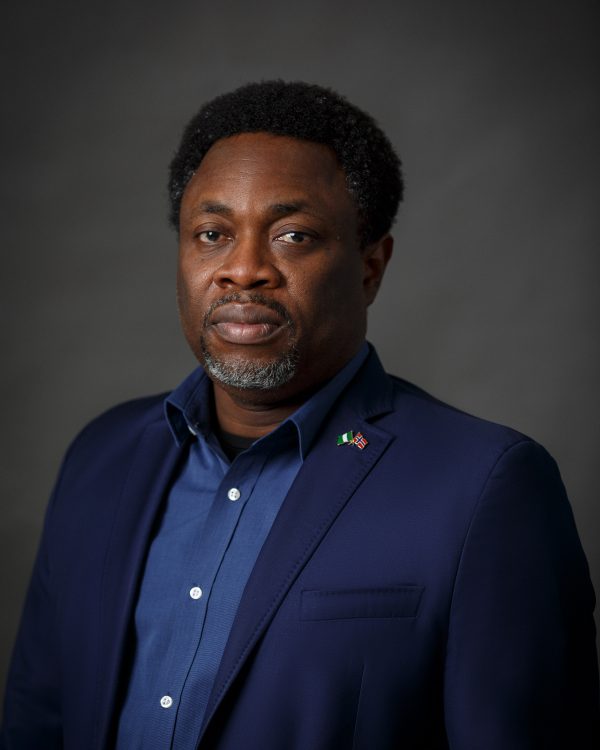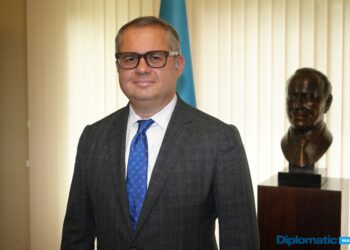The Diplomatic Ties between Nigeria and Norway dates to just after Nigeria’s independence in 1960. Norway has over the years demonstrated incredible interest and support towards Nigeria’s development.
One of the finest minds in Corporate Nigeria, CEO of Marine Platforms, Mr. Taofik Adegbite was recently appointed the Norwegian Consul General to Nigeria following his efforts in galvanizing opportunities that both countries can mutually benefit from as trade partners. Patriotism and altruism are two key values you cannot take away from him because of his exemplary company’s corporate governance culture and capacity building over the years that transcend self. He has succeeded in co-creating value for Nigeria and Norway.
In this exclusive interview with Diplomatic Watch, he discloses how he got into the Maritime Industry, why and how important the Nigerian local content law is to Nigerian businesses and what he thinks earned him the position of Consul General. He also tells why he is an advocate of win-win as it relates to the existing bilateral relations between Nigeria and Norway. Mr. Adegbite also left some pieces of advice to emerging entrepreneurs who may want to want to follow his giant strides. Excerpts.
DW: You have a background in Computer Science, Economics and Management. How did you veer into the Maritime Industry? How did it all begin?
Taofik: My partner and my friend from old came around and proposed we go into the oil and gas industry. Of course we decided at the time to go into the deep water segment of the industry, hence vessels and Remotely Operated Vehicles (ROVs). We set out with subsurface where we got partners to run down hole tools. Thereafter, we went into subsea operations. We found that by virtue of the service we render, we do everything from the ships and at the time we had to charter boats from third parties. Therefore, borne out of necessity we realized we needed to be able to control our operations. Before, the ship owner will tell you they don’t want you to go to a particular place while the clients want you to go contrary to our core value of client centricity. We recognized that if we control the entire process, we will have more flexibility and yes we will be able to provide better service to clients. This principally pushed us into acquiring the ships. Basically, it was going into the oil industry first and then necessity pushed us into the maritime space.
DW: Please tell us about Marine Platforms
Taofik: Marine platform as you must have seen is an oil field service company borne out of the local content initiative. At the moment we are trying to integrate our subsea knowledge with the downhole knowledge and give better consolidated service to the client. This in the end reduces the cost to the client.
DW: As an indigenous company, how have you been able to subscribe to Nigeria’s local content law?
Taofik: I must tell you there is a very huge difference between when we did not have the law and of course when we have the law. The Nigerian content monitoring board has done a great deal of work in pushing the International Oil Companies (IOC)s; shifting the orientation of the industry to retaining value in-country. Before the local content came to be the entire value chain drove capital flight. Nigerians were not participating in the services. We were not refining our crude, thus, you realize we were really subsistent; we were just extracting crude. From how it is extracted, to how it is processed eluded us. We were just selling raw material -crude. I think the first level is what local content has done where we are participating in how it is exploited. Then we move into the refining and into other variants. Therefore, Local content by no means has helped. And I think it is something that should be replicated in some other sectors of the economy so that we can create the much-needed multiplier effect to stimulate our economy.
DW: It is on record you are the first Nigerian that delivered an offshore Subsea Construction Vessel for oil and gas sector in Nigeria through the first ever shipbuilding contract between a Nigerian company and a Norwegian shipyard. Why and how did you do it?
Taofik: Like I said earlier it was borne out of necessity. We were servicing the clients. We had to charter boats and we had to get the partners to bring in the equipment. Due to lack of insufficient control, we were always at the mercy of our foreign partners and only go as far as they want to go.We would have just been a trading company where we will be renting equipment and ships and getting commission. So, we had to depart from that to start building capacity in-country; in house.
He who pays the piper dictates the tune. If you don’t own the equipment you cannot control anything. Hence, we had to first buy the equipment. Then we needed to move into buying the vessels. It is only then you can truly say you are really a Nigerian service company.
It is important to mention that with foreign vessels you are constrained by the flag; and the nationality of the crew. You cannot truly not train your locals on foreign flagged vessels the way you will train your locals on your flagged vessel. In order to overcome, we went ahead those challenges and commenced the acquisition. It’s been successful so far. All thanks to support from NCDMB, IOCs, and NAPIMS (National Petroleum Investment Management Services) and NNPC at large.
DW: How did you get appointed as the Consul General to Norway and how do you feel about it?
Taofik: Now I need to be exemplary, so it is a task. It is obvious I need to live above board. There are a lot of stories and or talks around who we are. We need to look at how to create value beyond Marine platforms to the greater Nigeria. sector by sector and value co-creation. What does Norway have to offer Nigeria? What are the opportunities we have in Nigeria that need to be tapped into technology wise, finance, etc?
As you know Norway has a strong maritime sector, oil and gas, energy, renewable, fisheries and aquaculture, just to mention a few. Consequently, we need to latch on to them. I think that is primarily my role. I have started designing the strategy. What are the quick wins? What are the very long term ones? So that gradually we start connecting the dots
DW: In what ways do you create a win-win situation between both countries?
Taofik: If Marine Platforms had not bought vessels in Nigeria, it means we would not have been able to train Nigerians. We would have been making money from the charter. but value will not be created. The factories in Norway will be working and the only Norwegian economy will be good for it. They equally don’t want that. But unfortunately, you are as good as what you ask for and what you want. They will not force a vessel on you or anything on you. They believe you are a rational being. Because we want to create a win-win which is what you are talking about, where it will be beneficial to Nigeria and of course beneficial to Norway.
We were able to pull resources together, we were able to save profitability and plough it back into the business by buying ships. So, what does that do? Immediately it tips the zero sum where value is created and not just in Norway but also a win-win situation in Nigeria. When you buy the ship, Norwegian ship yards will work and build the ship. Your kids could have a training pedestal; your insurance company can latch on to the ship because they are now owned. Your bank will be able to get involved. You can see you are creating a multiplier in your country as against when it is on charter. Some other companies may decide not to do what we have done. Value will be created in Nigeria from the monies made. As a result, do you want to say bilateral relationship is always one sided? No! What typically happens is that as individuals we often get self-centered; you make all the money and you don’t build capacity. What Maritime Platforms has always been or what we stand for is actually to create a win-win and that is what we have demonstrated by virtue of our business dealings with the Norwegians. And that is why they are happy. There are loads of people that have not done what we have done. They would have chosen those kinds of people if they wanted a zero sum game; if they wanted it to be one sided. There are Nigerians that would have been willing accomplices, who will not even bother about creating a bilateral or a balance relationship. The Norwegians, I know are equitable and fair. In their country, the social welfare structure is very strong. So, I am sure it is part of the determinants of saying Taofik is the kind of person that will create the desired balance. They know that it won’t be winner takes it all. It will be a win-win for both countries. And that is what I am advocating. That is the strategy we are putting in place. How would Nigerians benefit from their technology? How would they benefit by penetrating Nigeria deeper. And that is creating a balance world.
DW: What about Nigeria’s Human capacity development?
Taofik: This is the core of value co-creation. Their industries must continue working and our industries must be developed. And that is a win-win. If you keep exporting all your crude; exporting everything and they sell back the finished product to you, you are not creating a balance world. But if you start leveraging on their technology, their skills and developing your own people, then what you are doing is creating wealth. People are earning a living from the factories that you have built, as against just a single extractive point where few people are working and you are exporting everything. You can imagine if the crude had been processed here and your people are engaged. The number of people you will be creating employment for. So that in itself is value co-creation. Your society will be wealthier and safer. That is where I am coming from. It is a decision that you need to make from get go when you are setting up a business. One thing we have seen clearly in Nigeria, the finance and banking sector has already proven that. Before the banking revolution there were banks in Nigeria but you could not see this kind of explosion and you know the huge balance sheet we are seeing. Of course that is why you are seeing a lot of Nigerians in businesses being funded and employment created.
When you own equipment early enough, you will have the ability and capacity to train your people. As you are aware, a lot of our graduate need hands on experience and this ownership initiative has given us the opportunity to realize this dream.









